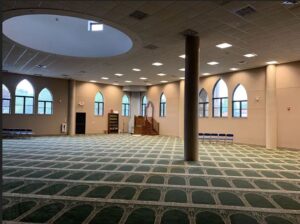10 RULES TO SIT IN SHEIKH ZAKARIYYA RAHMATULLAHI ALAIHI’S CLASS
![]()
Hadhrat Sheikh Moulana Zakariyya Khandelwi Rahmatullahi Alaihi mentions 10 rules in Aap Beti :
1. Non-attendance at classes was a big crime in my sight. My
attendance register of my own class showed that very seldomly were
students absent through sickness. Occasionally leave was granted, but if
throughout the years one checked, one would seldomly find any
non-attendances.
Maulana Manzoor Ahmad Khan Saheb , one of the second year asaatizah
(teachers) of our madresah, was a very pious and humble person. In his
register you would find a lot of marks indicating non-attendance. He had
a very well-known saying: “There is no reward in attending Zakariyya’s
class, because students attend out of fear. Reward is granted for
attending my class, because the elders had faith in me.”
When a student was absent from my class, then the next day I would
tell him: “I have removed your name from the ‘Abu Dawood’s’ register, or
from ‘Bukhari’ (as the case may be). Instead of me putting in a
complaint against you with Mohatamim Saheb, go to him and complain that
without his orders, I have dismissed you from the class. Go and bring me
a written order to re-instate you.”
2. Secondly it was very important that students should take their
seats in an orderly and disciplined manner. I detested their sitting all
over the place, some ahead of others. They should be arranged in
straight lines like Salaah.
3. I was also very strict on the outward appearance of the students. I
greatly disapproved of them adopting any outer dressing, which was
contrary to the appearance of the pious predecessors and the elders. I
was especially strict on beards. In all cases no student was ever
accepted in the madresah, if he cut or shaved his beard. If by chance, a
student who cut his beard did acquire an admittance form and was
admitted, he was not allowed in my classes.
One such student in spite of being guilty of this haraam act, was
admitted to the madresah’s daurah (final year) class. I was then
teaching ‘Abu Dawood Shareef’. Even though he brought recommendations
from Mohtamim Saheb (principal) and other teachers, I refused him
entrance to my class until such time that I saw him having a beard. He
continued to press me, telling me that he was admitted to the classes of
other elders, but to the end I remained unmoved.
A few years later I received a letter from him asking to be allowed
to enter into bay’at. I remembered him and wrote back to him, “You have
had my experience of my harshness and ill-mannered acts. Under these
circumstances , I suggest that you choose some other more soft-natured
Sheikh.”
He wrote back, “No, I am in need of a hard person like you.”
4. It had always been my practice concerning those strong words
sometimes used in ‘Kitabul-Hudood’ etc, to never hesitate to translate
them directly into their literal Urdu meanings and to never try to
translate them euphemistically, so as to give a softer tone. I always
believed their Urdu equivalent corresponded with the Arabic meanings,
and how can I with my tongue improve the words of Rasulullah Sallallahu
Alaihi Wa Sallam, and Sayyidina Abu Bakr Radhiyallahu Anhu? But I also
told my class, right at the outset that if during my translation of such
words, any student should laugh, whereby, those words are made to
appear like swear -words, I would personally beat them right there in
the class. During these classes, at the time of translating, I used to
use such angry tones that no student had the courage to laugh and if
there was one who dared, I personally took care of him.
5. For a student to sit with his elbow resting on the desk, was
something I had always considered to be very ill-mannered and
disrespectful. The first time I saw it, I would reprimand the person. If
he had happened to sit with his elbows on the kitaab, or hands on chin,
or sleep on the kitaab, it was an even worse crime.
6. In those days I was quite lean and athletic. If such a thing
happened a second time after a first warning, I would jump from my
place, give the offender a quick slap and return to my place. My daurah
students often would quite astonished, wondering what had happened.
However they came to know my habits and would realize someone had fallen
asleep. In this respect, I did not give any consideration even to the
children of the elders or prominent ones.
7. I also insisted upon students sitting with respect in my Hadith
classes. I never allowed someone to sit cross-legged nor to sit leaning
against the wall; and warned against this on the very first day. They
had to sit so that no inner or outer disrespect was shown to the Hadith
or Kitaab, neither thorugh their movements nor acts.
8. I was always particular about their dressing. I always disliked (a
really) short kurtah or a tight fitting trouser and people dressed like
this, should never be allowed to stand in the first saff of musallees,
because they unashamedly show the forms of their bodies to others.
9. In my class there had to be the utmost respect for the Mujtahid
Imaams and never should anyone raise objections against them, not in
word nor in heart. There were some people who in their enthusiasm to
promote Hanafi ideals, used some unflattering words and criticism
against certain Imaams and Ulama of hadith. This was something I loathed
and detesed.
Hadhrat Gangohi once gave an amazing lesson in favour of the Hanafi
madhab. One of the students said: “If Imaam Shafi’i had been present to
hear this he would have withdrawn his opinion.”
Hadhrat Gangohi replied: “Tawbah! Tawbah! Astagfirullah! If that
great Mujtahid Imaam had been present, this lecture of mine would have
been a mere doubt expressed against his mazhab, and he would have
answered me. Only his words and opinions are before us, that we
endeavour to prove that Imaam Abu Haneefa’s opinions are nearer to the
Qur’aan and Ahaadith. Bit if today anyone of those Mujtahids had been
present, we would have had no other way out, except to follow him.”
10. Another aspect which I disliked and of which I made students
aware of right at the beginning of the year, was the fact that if ever
they wanted to mention the opinions of any of my contemporary Ulama,
while raising doubts or queries in my class, they could do so, but they
were never to mention the name of the person.
Pg 35, Aap Beti: Vol.6



